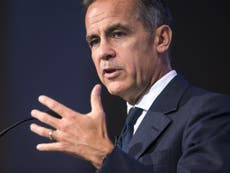Five things to look out for in the global economy this week
All eyes this week in the UK will be on the economic data in the run up to the budget on 22 November


The first thing I want to know about this week has nothing to do with interest rates, the budget, Donald Trump’s tax plan or anything like that. It is what retailers have learnt from Singles' Day in China last Saturday. We are told that more than $25bn goods were sold, making this by far the biggest shopping event in the world, ever. But it is an online sale, or at least it started as one. So why have a particular day? I won’t go into the history here except to note that this is the genius of Jack Ma, founder of Alibaba. But the key here is that apparently they have managed to combine online shopping at conventional retailing and it is this that has driven the growth. That is interesting and I would like to understand more about how they manage to do it.
Back to the conventional stuff. All eyes this week in the UK will be on the economic data in the run up to the Budget on 22 November. The three most important elements are: on Tuesday the inflation figures, on Wednesday the labour market statistics, and on Thursday retail sales.
Expect inflation as measured by the consumer price index to nudge above 3 per cent, leading to the Governor of the Bank of England writing a letter to the Chancellor explaining why. The main driver seems to be the rise in the oil price, the highest for three years, but there are often surprises. But a number above 3 per cent will remind people that their real wages are falling because wage and salaries are unlikely to be rising at that rate. What will he say in the letter?
We will see that from the labour market stats the next day, which will presumably confirm the solid demand for labour, falling unemployment, and an increase in hours worked. This picture of the job rich but wage poor recovery seems likely to continue awhile.
I expect however the retail sales numbers to be quite weak, partly a function of a general loss of consumer confidence, but more because of the shift in purchasing patterns: people tending to buy experiences (meals out and so on) rather than goods. But let’s see. A better guide to people’s spending than the retail sales numbers are the tax receipts on VAT. We don’t however get those until the following week, when the October public finances are published on the 21st, the day before the budget.
So as far as Britain is concerned, this is going to be a waiting week, waiting that is for the budget the week after – a budget that takes on considerable political significance given the weak position of the Prime Minister. But there is a world beyond our shores and there are two things that will be worth watching, one in the US, the other in Europe.
In the US it will be the inflation figures, and the question here is whether soft numbers will inhibit the Federal Reserve from making its next rise in interest rates in December. Expect the figures to be quite muted but it would be surprising if this led the Fed to can the much-trailed rise in rates at the next Fed meeting.
In Europe, we get third quarter GDP figures for a number of countries, including Germany, and for the eurozone. Germany is growing strongly, for there solid growth taking place across the Continent. The key question is whether this is simply a standard cyclical recovery or whether the growth potential of continental Europe has risen. We won’t know for some time. Europe can certainly grow for a while yet because most countries still have spare capacity, but that does not mean the long-term has improved. The eurozone is at the moment growing a little faster than the UK – a little above 2 per cent a year as opposed to a little below – so decent growth numbers will have a political impact. Whether they should or not is another matter.




Join our commenting forum
Join thought-provoking conversations, follow other Independent readers and see their replies